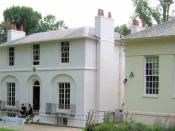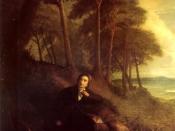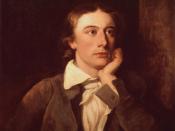Romanticism is an intellectual movement with origins dating in the late 18th century, featuring prominently in English literature. A group of poets emerged generating a new mood in literary objectives, casting off their predecessors' motives and instead creating a rich and forceful art; the main constituents of who comprise of: Wordsworth, Coleridge, Byron, Shelley and Keats. These poets embraced the basis of Romantic ideology, in particular, the use of strong emotion including aspects such as trepidation and aesthetic experiences, individual imagination as a critical influence, overturning the previous social conventions, principally the positions of the aristocrats in society . The Romantic composers also used to a significant degree historical and natural elements, for the most part, stressing the admiration of nature through the comprehensive, limitless use of imagination and lucid symbolism. Of the specialised group of Romantics, Keats relationship with Romanticism although not as typical like that of Wordsworth, it is clear that he drew inspiration from Romanticism both intellectually and culturally.
Keats strong use of creative expression, rapture, physical experience, mythology, evocative sensual pleasure, exploration of nature and limitless imagination recreated in his poems, especially in 'Ode to a Nightingale' and 'To Autumn' reinforce not only his connection but his contribution which has made a true sense of Romanticism has made him to a great extent one the most typically Romantic poets.
Keats epitomises the typical Romantic poet, through his flair for finding suitable influences, considered an archetype of the Romantics, in which he was exposed to sensual pleasures and the delights of free imagery, his other influences including painter Benjamin Haydon whose guidance saw him sharpening his visual senses and visual appreciation, but most notably critic William Hazlitt. Hazlitt's passion for Shakespeare underlies Keats' central passion of "negative capability, which would later feature prominently in...


